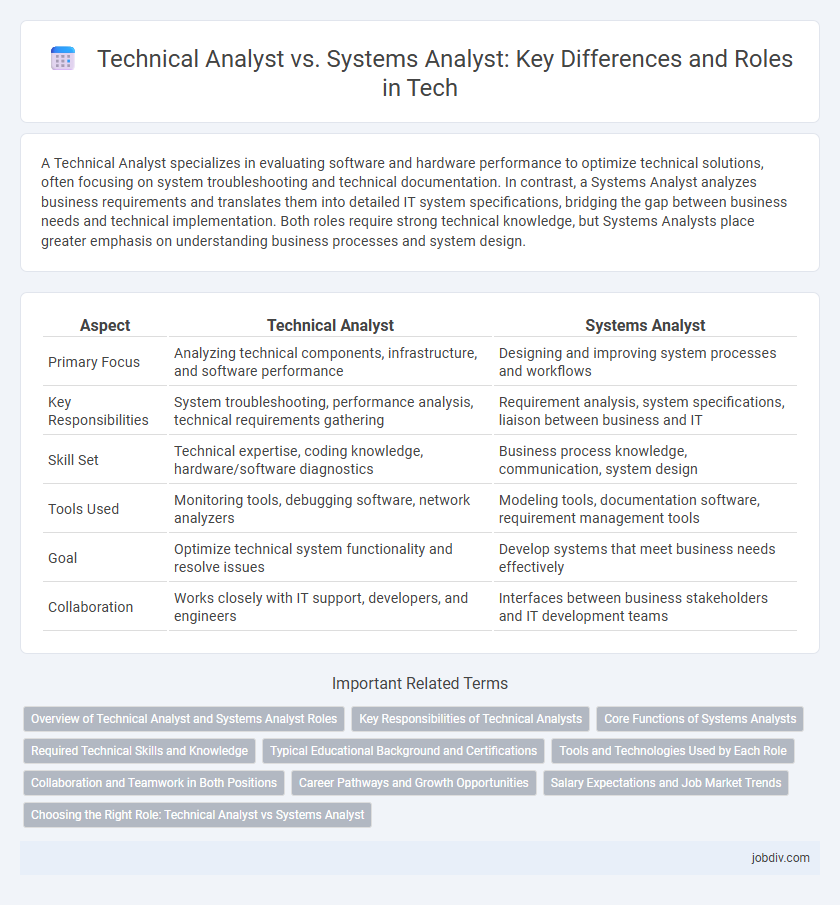A Technical Analyst specializes in evaluating software and hardware performance to optimize technical solutions, often focusing on system troubleshooting and technical documentation. In contrast, a Systems Analyst analyzes business requirements and translates them into detailed IT system specifications, bridging the gap between business needs and technical implementation. Both roles require strong technical knowledge, but Systems Analysts place greater emphasis on understanding business processes and system design.
Table of Comparison
| Aspect | Technical Analyst | Systems Analyst |
|---|---|---|
| Primary Focus | Analyzing technical components, infrastructure, and software performance | Designing and improving system processes and workflows |
| Key Responsibilities | System troubleshooting, performance analysis, technical requirements gathering | Requirement analysis, system specifications, liaison between business and IT |
| Skill Set | Technical expertise, coding knowledge, hardware/software diagnostics | Business process knowledge, communication, system design |
| Tools Used | Monitoring tools, debugging software, network analyzers | Modeling tools, documentation software, requirement management tools |
| Goal | Optimize technical system functionality and resolve issues | Develop systems that meet business needs effectively |
| Collaboration | Works closely with IT support, developers, and engineers | Interfaces between business stakeholders and IT development teams |
Overview of Technical Analyst and Systems Analyst Roles
Technical Analysts specialize in evaluating and improving IT infrastructure, focusing on troubleshooting, system performance, and technical solution implementation. Systems Analysts bridge business requirements with technology, analyzing system workflows, designing system specifications, and ensuring seamless integration of software and hardware components. Both roles require strong analytical skills, but Technical Analysts concentrate more on technical problem-solving, while Systems Analysts emphasize aligning technology with business processes.
Key Responsibilities of Technical Analysts
Technical Analysts primarily focus on diagnosing system malfunctions and analyzing software or hardware performance to optimize IT infrastructure. They interpret technical data, conduct root cause analysis, and recommend solutions to enhance system efficiency and security. Their key responsibilities include monitoring system health, troubleshooting technical issues, and supporting development teams with technical expertise.
Core Functions of Systems Analysts
Systems Analysts specialize in analyzing and designing information systems to improve organizational efficiency by gathering requirements, modeling workflows, and liaising between business stakeholders and IT teams. Their core functions include system specification documentation, process re-engineering, and feasibility analysis to ensure proposed solutions align with business goals. Unlike Technical Analysts who focus on technical troubleshooting and performance optimization, Systems Analysts drive the strategic integration of technology with business processes.
Required Technical Skills and Knowledge
Technical Analysts require proficiency in data modeling, software development lifecycle, and scripting languages such as Python or SQL to analyze system performance and troubleshoot technical issues effectively. Systems Analysts need in-depth knowledge of system architecture, business process modeling, and requirements engineering to design and optimize integrated information systems aligned with organizational goals. Both roles demand a strong understanding of databases, networking concepts, and software tools, yet Technical Analysts emphasize technical diagnostics while Systems Analysts prioritize functional system design.
Typical Educational Background and Certifications
Technical Analysts typically hold degrees in computer science, information technology, or software engineering, often complemented by certifications such as CompTIA A+, Certified Information Systems Security Professional (CISSP), or Microsoft Certified Solutions Expert (MCSE). Systems Analysts commonly possess backgrounds in information systems, business administration, or computer science, with certifications like Certified Business Analysis Professional (CBAP), Project Management Professional (PMP), or ITIL Foundation emphasizing systems integration and project management skills. Both roles benefit from continuous education but diverge in focus--Technical Analysts prioritize hands-on technical certifications, whereas Systems Analysts emphasize strategic and business-aligned credentials.
Tools and Technologies Used by Each Role
Technical Analysts primarily utilize data visualization tools like Tableau and Power BI, alongside statistical software such as SAS and R, to interpret and present data-driven insights. Systems Analysts focus on system modeling and design tools including UML diagrams, CASE tools like Rational Rose, and enterprise architecture frameworks like TOGAF to optimize IT solutions. Both roles leverage collaboration platforms such as JIRA and Confluence to manage project workflows and documentation efficiently.
Collaboration and Teamwork in Both Positions
Technical Analysts and Systems Analysts collaborate closely to bridge business needs and technical solutions, ensuring seamless project execution and stakeholder satisfaction. Their teamwork revolves around clear communication, requirement gathering, and continuous feedback loops to optimize system performance and meet evolving business demands. This synergy enhances problem-solving efficiency and drives successful implementation of technology initiatives within organizations.
Career Pathways and Growth Opportunities
Technical Analysts typically specialize in evaluating and optimizing IT systems, software performance, and technical infrastructure, often progressing towards roles in IT management or specialized technical consultancy. Systems Analysts focus on bridging business needs with IT solutions, enhancing system efficiency and user experience, with career advancement paths leading to business analysis, project management, or IT strategy roles. Both pathways offer growth opportunities in emerging technologies like AI, machine learning, and cloud computing, emphasizing continuous skill development in programming, data analysis, and systems design.
Salary Expectations and Job Market Trends
Technical Analysts typically command salaries ranging from $70,000 to $110,000 annually, reflecting strong demand in data-driven industries like finance and technology. Systems Analysts earn between $65,000 and $100,000, with job market trends favoring roles that integrate system design and business process optimization. Growth projections indicate a steady increase in both fields, driven by digital transformation and the need for enhanced analytical and systems management skills.
Choosing the Right Role: Technical Analyst vs Systems Analyst
Choosing the right role between a Technical Analyst and a Systems Analyst depends on your expertise and career goals; Technical Analysts specialize in troubleshooting software and hardware issues, ensuring systems perform optimally, while Systems Analysts focus on evaluating and designing complex IT systems to meet business requirements. Understanding the specific responsibilities--such as systems integration, requirements gathering, and technical support--helps align your skills with the demands of each position. Prioritize roles that emphasize your strengths in technical problem-solving or systems design to maximize professional development and impact.
Technical Analyst vs Systems Analyst Infographic

 jobdiv.com
jobdiv.com